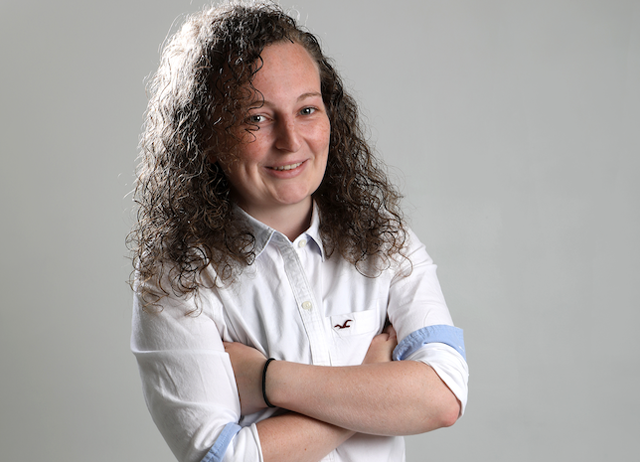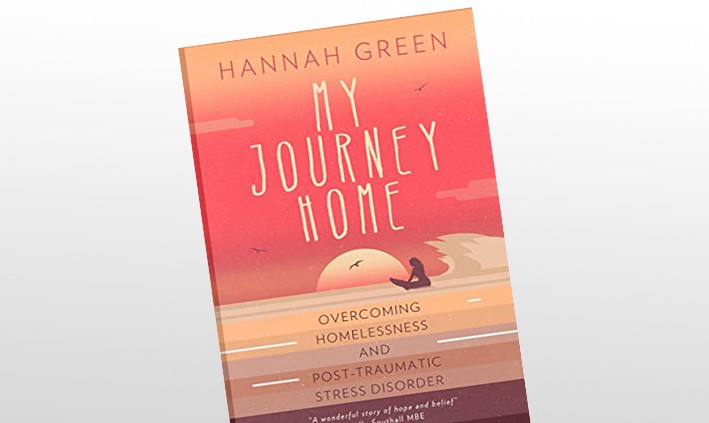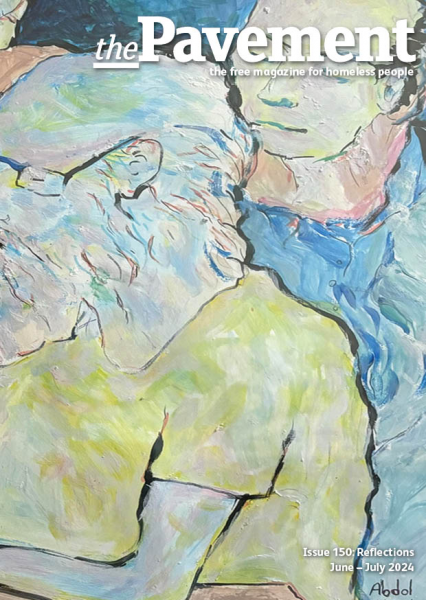
Established 2005 Registered Charity No. 1110656
Scottish Charity Register No. SC043760
DONATE
RECENT TWEETS
 My Journey Home: Hannah Green spoke to the Pavement trainee reporters about how she’s written about her experience of homelessness. © Rich Maw at Infocus Photographic, Scarborough
My Journey Home: Hannah Green spoke to the Pavement trainee reporters about how she’s written about her experience of homelessness. © Rich Maw at Infocus Photographic, Scarborough
Author Hannah Green discusses
writing and homelessness with
our trainee reporters, Paul
Atherton, Lee Foxhall, Charlie
Radbourne, Sarka, Sheryle
Thomas & trainer Giselle Green
Q: How did you start off?
I literally wrote down everything and
sent it to the editor and asked what
angle should I be going from. Then
we narrowed it down and ended up
focusing on PTSD and homelessness.
Q: Do you plan what you're going
to write before you start?
I don’t really make a plan. I love
surfing, so I'll go for a surf and I’ll get
back and have some inspiration. Or
sometimes I'll see a tweet and think,
‘I have to write about that’.
Q: Charlie: Why do you go surfing?
I got signed up to this surf therapy
course and it was meant to be six
weeks. Basically I just fell in love with
it. It was quite dangerous at times. I
think I thrived on that adrenaline.
Q: Lee: Before writing about what
others have gone through, would
you recommend you write about
your life to take it all in again and
move forward?
That’s a very personal decision. For
me it helped, it was very therapeutic
to write it all down and see it all laid
out and think, "shit I’ve survived that." But if there's stuff in there you
haven’t dealt with and you write it
down, it might trigger things and
make you feel worse.
Q: You’ve written a book about
your life, My Journey Home, which
is being published in April. How
did that come about?
The week before lockdown I was with
my friends and I joked that if there
was a lockdown I would write a book.
Then lockdown happened, so I just
started writing.
Q: Paul: What made you decide to
go with that particular publisher?
I pitched to so many publishers.
Two came back to me. I went with
the one I went with because they
specialise in mental health type
stuff and were more specialised. I also won a grant from a charity, a
scheme for young people who had
ideas. [Hannah’s grant covered the
publishing costs]

Q: How do you feel about the book
coming out?
It’s terrifying, I won't lie. But it has
the potential to help people, which is
why I’ve done it.
Q: Sheryle: Were there barriers to
accessing help being female when
you were homeless or was it easier
as a woman to get support?
For me it made things harder.
I was in this supported lodging
scheme where you stay in a
volunteer’s house longer term. The
woman I was staying with took in
exchange students who were all
males of similar age to me which
was a massive issue. I was told if
I left, I would be making myself
intentionally homeless.
Q: Sarka: Is there anything you
learned that made it easier?
When I was experiencing
homelessness, I avoided men as much as possible. What
would’ve helped me was having a
hostel just for women: single sex
accommodation where I knew there
were no men. That should be a thing
everywhere, but it’s not.
Q: What advice would you give to
your younger self?
I would have told myself to keep
myself to myself more, and not get
involved in dodgy things with other
people. I would have just told myself
it's not going to be like this forever
and there's a way out of it. So just
hang in there.
Q: You’ve been writing a report
for the Centre for Homelessness
Impact about access to
healthcare. What were the top
issues that people had?
One was around person-centred,
trauma-informed care and services
being led by the person rather than
them being told they must do this
and that. If someone says to me
you have to do this, my brain goes
crazy and I'm like no, that’s not
happening.
- My Journey Home demonstrates the power of the sea, and a good cup of tea.
- In 2019 Hannah Green was living in a hostel, now her autobiography is being published in April. Follow Hannah on Twitter @h_green21
- Hannah talks about post-traumatic stress disorder
(PTSD). She was helped by surf therapy. Also see
www.ptsduk.org and our trauma guide on p22 – 23
June – July 2024 : Reflections
CONTENTS
BACK ISSUES
- Issue 150 : June – July 2024 : Reflections
- Issue 149 : April – May 2024 : Compassion
- Issue 148 : February – March 2024 : The little things
- Issue 147 : December 2023 – January 2024 : Next steps
- Issue 146 : October 2023 – November 2023 : Kind acts
- Issue 145 : August 2023 – September 2023 : Mental health
- Issue 144 : June 2023 – July 2023 : Community
- Issue 143 : April 2023 - May 2023 : Hope springs
- Issue 142 : February 2023 - March 2023 : New Beginnings
- Issue 141 : December 2022 - January 2023 : Winter Homeless
- Issue 140 : October - November 2022 : Resolve
- Issue 139 : August - September 2022 : Creativity
- Issue 138 : June - July 2022 : Practical advice
- Issue 137 : April - May 2022 : Connection
- Issue 136 : February - March 2022 : RESPECT
- Issue 135 : Dec 2021 - Jan 2022 : OPPORTUNITY
- Issue 134 : September-October 2021 : Losses and gains
- Issue 133 : July-August 2021 : Know Your Rights
- Issue 132 : May-June 2021 : Access to Healthcare
- Issue 131 : Mar-Apr 2021 : SOLUTIONS
- Issue 130 : Jan-Feb 2021 : CHANGE
- Issue 129 : Nov-Dec 2020 : UNBELIEVABLE
- Issue 128 : Sep-Oct 2020 : COPING
- Issue 127 : Jul-Aug 2020 : HOPE
- Issue 126 : Health & Wellbeing in a Crisis
- Issue 125 : Mar-Apr 2020 : MOVING ON
- Issue 124 : Jan-Feb 2020 : STREET FOOD
- Issue 123 : Nov-Dec 2019 : HOSTELS
- Issue 122 : Sep 2019 : DEATH ON THE STREETS
- Issue 121 : July-Aug 2019 : INVISIBLE YOUTH
- Issue 120 : May-June 2019 : RECOVERY
- Issue 119 : Mar-Apr 2019 : WELLBEING
- Issue 118 : Jan-Feb 2019 : WORKING HOMELESS
- Issue 117 : Nov-Dec 2018 : HER STORY
- Issue 116 : Sept-Oct 2018 : TOILET TALK
- Issue 115 : July-Aug 2018 : HIDDEN HOMELESS
- Issue 114 : May-Jun 2018 : REBUILD YOUR LIFE
- Issue 113 : Mar–Apr 2018 : REMEMBRANCE
- Issue 112 : Jan-Feb 2018
- Issue 111 : Nov-Dec 2017
- Issue 110 : Sept-Oct 2017
- Issue 109 : July-Aug 2017
- Issue 108 : Apr-May 2017
- Issue 107 : Feb-Mar 2017
- Issue 106 : Dec 2016 - Jan 2017
- Issue 105 : Oct-Nov 2016
- Issue 104 : Aug-Sept 2016
- Issue 103 : May-June 2016
- Issue 102 : Mar-Apr 2016
- Issue 101 : Jan-Feb 2016
- Issue 100 : Nov-Dec 2015
- Issue 99 : Sept-Oct 2015
- Issue 98 : July-Aug 2015
- Issue 97 : May-Jun 2015
- Issue 96 : April 2015 [Mini Issue]
- Issue 95 : March 2015
- Issue 94 : February 2015
- Issue 93 : December 2014
- Issue 92 : November 2014
- Issue 91 : October 2014
- Issue 90 : September 2014
- Issue 89 : July 2014
- Issue 88 : June 2014
- Issue 87 : May 2014
- Issue 86 : April 2014
- Issue 85 : March 2014
- Issue 84 : February 2014
- Issue 83 : December 2013
- Issue 82 : November 2013
- Issue 81 : October 2013
- Issue 80 : September 2013
- Issue 79 : June 2013
- Issue 78 : 78
- Issue 77 : 77
- Issue 76 : 76
- Issue 75 : 75
- Issue 74 : 74
- Issue 73 : 73
- Issue 72 : 72
- Issue 71 : 71
- Issue 70 : 70
- Issue 69 : 69
- Issue 68 : 68
- Issue 67 : 67
- Issue 66 : 66
- Issue 65 : 65
- Issue 64 : 64
- Issue 63 : 63
- Issue 62 : 62
- Issue 61 : 61
- Issue 60 : 60
- Issue 59 : 59
- Issue 58 : 58
- Issue 57 : 57
- Issue 56 : 56
- Issue 56 : 56
- Issue 55 : 55
- Issue 54 : 54
- Issue 53 : 53
- Issue 52 : 52
- Issue 51 : 51
- Issue 50 : 50
- Issue 49 : 49
- Issue 48 : 48
- Issue 47 : 47
- Issue 46 : 46
- Issue 45 : 45
- Issue 44 : 44
- Issue 43 : 43
- Issue 42 : 42
- Issue 5 : 05
- Issue 4 : 04
- Issue 2 : 02
- Issue 1 : 01
- Issue 41 : 41
- Issue 40 : 40
- Issue 39 : 39
- Issue 38 : 38
- Issue 37 : 37
- Issue 36 : 36
- Issue 35 : 35
- Issue 34 : 34
- Issue 33 : 33
- Issue 10 : 10
- Issue 9 : 09
- Issue 6 : 06
- Issue 3 : 03
- Issue 32 : 32
- Issue 31 : 31
- Issue 30 : 30
- Issue 29 : 29
- Issue 11 : 11
- Issue 12 : 12
- Issue 13 : 13
- Issue 14 : 14
- Issue 15 : 15
- Issue 16 : 16
- Issue 17 : 17
- Issue 18 : 18
- Issue 19 : 19
- Issue 20 : 20
- Issue 21 : 21
- Issue 22 : 22
- Issue 23 : 23
- Issue 24 : 24
- Issue 25 : 25
- Issue 8 : 08
- Issue 7 : 07
- Issue 26 : 26
- Issue 27 : 27
- Issue 28 : 28
- Issue 1 : 01
